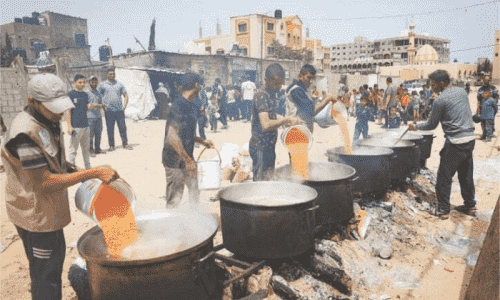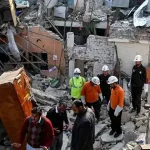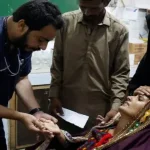RAFAH: While US National Security Adviser Jake Sullivan was in Israel for negotiations on the crisis, an Israeli strike in a residence in the central Nuseirat refugee camp in Gaza on Sunday resulted in the deaths of 31 more Palestinians and the wounding of 20, according to the Palestinian civil defense agency.
As seen According to Yasser Abu Oula, “there are still bodies under the rubble” and “an entire residential complex was destroyed.” The US has warned that Israel may become embroiled in a protracted counterinsurgency fight as a result of its bombing of the northern and central regions of the coastal enclave.
Additionally, Israeli forces have advanced into Rafah, a city in the deep south of the Gaza Strip where the US claims 800,000 inhabitants have lately been forced to flee.
A plan for Gaza’s post-war administration has been called for, and Israel’s Prime Minister Benjamin Netanyahu, who has sworn to keep fighting Hamas, has encountered strong opposition from both major street protests and Washington, his ally, as well as from members of his war cabinet. Benny Gantz, a centrist lawmaker, threatened to pull out of the hard-right coalition if Netanyahu did not adopt a post-war “action plan” by June 8.
UN relief director warns of “apocalyptic” effects from shortages in Gaza
At least 35,456 Palestinians have died in Gaza since Israel’s assaults began to intensify.
Suffering is all that exists.
Only infrequent humanitarian supplies have been able to lessen the agony of the 2.4 million people living in the long-blockaded Gaza Strip as a result of Israel’s embargo.
About two weeks after Israel invaded the city, resident of Rafah Rinad Joudeh, 41, lamented “destruction, fear, and terror,” saying, “We are living through a humanitarian catastrophe in every sense of the word.”
“Despite all the calls by the international community not to launch an offensive in Rafah, in reality an offensive started on May 6,” stated the head of the UN organization aiding the Palestinians.
Since then, UNRWA chief Philippe Lazzarini told reporters in Amman that “we have again about half of the population of Gaza being on the road forced to flee” for safety, despite the fact that “we keep saying there is absolutely nowhere to go.”
UN chief of aid issues a warning
UN humanitarian head Martin Griffiths warned on Sunday that there is a risk of hunger in the beleaguered region and that the blockade of aid into Gaza might have “apocalyptic” consequences.
The impending famine that we have been talking about for so long will not materialize if fuel runs out and help is not delivered to the people who need it. It’ll be there, according to Griffiths.
And as members of the global community, I believe that the consequence is going to be really difficult. The UN’s emergency relief coordinator and undersecretary general for humanitarian affairs described the situation as “hard, difficult, and apocalyptic.”








